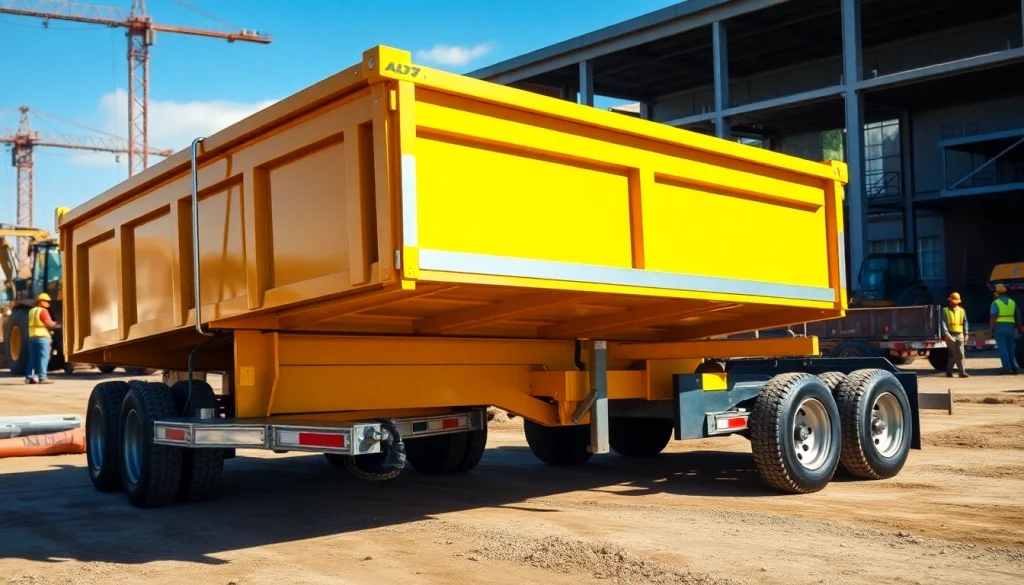Understanding Hydraulic Dump Trailers
What are Hydraulic Dump Trailers?
Hydraulic dump trailers are specialized vehicles designed to transport and unload heavy materials efficiently and effectively. Utilizing a hydraulic lift system, these trailers can elevate their beds to allow for fast unloading of materials such as dirt, gravel, sand, and debris. The operation is simple and user-friendly, providing an effective solution for construction, landscaping, and agricultural applications.
Benefits of Hydraulic Systems
The hydraulic lift system in dump trailers offers several advantages over traditional manual dumping mechanisms. First and foremost, hydraulic systems require significantly less physical effort to operate. A user can raise and lower the trailer bed with the push of a button, which can be operated either from within the cab of the towing vehicle or through a remote control. This ease of use enhances safety and reduces the risk of injury.
Additionally, hydraulic systems provide superior lifting power, allowing for the transportation of heavier loads without compromising stability or safety. The precise control of the dumping angle helps users unload their loads in a targeted manner, which is especially important in landscaping and construction projects where precision is key.
Key Features to Look For
When choosing a hydraulic dump trailer, several key features should be considered:
- Load Capacity: Ensure the trailer can handle the weight of the materials you intend to transport.
- Hydraulic System Type: Verify whether the system is electric or manual and consider which is best suited for your needs.
- Bed Size: The size of the trailer bed is crucial depending on the type and volume of materials you will be hauling.
- Durability: Look for trailers constructed from high-quality materials that can withstand the rigors of heavy use.
- Warranty and Support: Choose a brand that offers comprehensive warranties and reliable customer support.
Types of Hydraulic Dump Trailers
Standard vs. Heavy-Duty Models
Hydraulic dump trailers come in both standard and heavy-duty models. Standard trailers are usually sufficient for light to moderate hauls, such as moving landscaping materials or waste. Conversely, heavy-duty models are built to handle larger, more substantial loads, making them ideal for construction sites or sectors that demand higher durability and strength.
Heavy-duty trailers typically feature reinforced frames, higher axle ratings, and stronger hydraulic systems. When selecting between standard and heavy-duty, assess the expected load weights and the frequency of use to make an informed decision.
Electric vs. Manual Hydraulic Systems
Hydraulic dump trailers can be equipped with either electric or manual hydraulic systems. Electric systems are powered by a battery and usually offer a push-button control for operation. This makes them popular for users who prioritize ease-of-use and convenience.
On the other hand, manual hydraulic systems operate through a hand pump or other mechanical means. They may require more physical effort but are often simpler and require less maintenance than electric systems. Weighing the pros and cons of each option will help in choosing the right system for your operational needs.
Choosing the Right Size
Choosing the right size hydraulic dump trailer is critical for optimizing performance. Trailers are available in various lengths and widths, and picking one that accommodates your specific needs is essential. Consider what types of materials you will transport and how often you expect to load and unload. A larger trailer allows for more capacity but involves challenges such as maneuverability and storage. Assess your requirements to strike a balance between capacity and practicality.
Top Brands and Models
Leading Manufacturers in the Market
Several brands have carved a niche in the hydraulic dump trailers market by producing high-quality, durable trailers. Some of the top names include:
- Big Tex Trailers: Known for its durable, high-capacity trailers suitable for both commercial and personal use.
- Diamond C Trailers: Offers a diverse range of trailers with a reputation for quality engineering and innovative designs.
- Sure-Trac: Specializes in performance-oriented trailers designed for heavy-duty hauling.
- BWise Trailers: Offers a variety of models catering to different hauling needs and budgets.
- Load Trail: Known for rugged, reliable trailers made with high-quality materials and craftsmanship.
Comparing Prices and Features
An essential aspect of choosing a hydraulic dump trailer is understanding the pricing structures and the features that come with each model. Prices can vary widely based on specifications, manufacturer, and additional features. Typically, standard models range from $3,000 to $7,000, while heavy-duty trailers can start around $8,000 and go upwards of $15,000 or more for premium builds.
When comparing models, take into account not only the upfront cost but also the long-term value. Features such as warranty length, customer support, and additional functionalities (like extra axles or advanced hydraulic systems) can influence your buying decision.
User Reviews and Recommendations
Before making a purchase, seeking out user reviews and recommendations can provide valuable insights into the performance and reliability of specific models. Look for forums, customer testimonials, and professional reviews to gain a comprehensive understanding of how various hydraulic dump trailers perform in real-world scenarios. These reviews can also highlight common issues users encounter and how these were resolved.
Buying Considerations for Hydraulic Dump Trailers
New vs. Used Dump Trailers
When it comes to purchasing hydraulic dump trailers, buyers often face the dilemma of choosing between new and used options. New trailers come with the latest features, warranty coverage, and the assurance of reliability. However, they are usually more expensive and may not provide immediate value if only used occasionally.
Used trailers, meanwhile, are more budget-friendly. However, it’s crucial to inspect them thoroughly for wear and tear. Consider having a qualified mechanic examine the hydraulic system and the trailer’s structural integrity to prevent unexpected costs in the future.
Financing Options Available
Many buyers may require financing to acquire hydraulic dump trailers, particularly when investing in heavy-duty models. Financing options can range from traditional loans through banks and credit unions to financing offered directly by trailer manufacturers and dealerships. Leasing is also a viable route for businesses that prefer not to commit to ownership. Review all financing options, considering interest rates, terms, and your budget before making a decision to ensure the best financial outcome.
Where to Buy Hydraulic Dump Trailers for Sale
To find hydraulic dump trailers for sale, consider various purchasing options:
- Dealerships: Authorized dealerships often carry a wide range of new and used dump trailers, providing the advantage of financing and warranties.
- Online Marketplaces: Websites like eBay and specialized trailer sales platforms offer listings for both new and used trailers from various sellers.
- Auction Sites: Auctions can sometimes yield good deals on lightly used or surplus vehicles and trailers.
- Local Classifieds: Local online classifieds can be a hidden gem for finding used trailers at lower prices.
Maintenance and Care Tips
Basic Maintenance for Longevity
Maintaining hydraulic dump trailers is essential for prolonging their lifespan and ensuring safe operation. Regularly inspect the hydraulic system for leaks and perform necessary fluid changes according to the manufacturer’s guidelines. Additionally, check the trailer’s framework, lights, and tires for signs of wear. Regular lubrication of pivot points and moving parts will minimize friction and prevent premature wear.
Troubleshooting Common Issues
Even with proper maintenance, issues may arise with hydraulic dump trailers. Common problems include slow lifting or uneven dumping, often caused by low hydraulic fluid levels or leaks in the hydraulic lines. Address these problems promptly to avoid more costly repairs later. If your trailer struggles to lift a load, inspect the hydraulic pump and relief valve as these components may require replacement or servicing.
When to Seek Professional Help
While many maintenance tasks can be performed by users, some situations call for professional assistance. If you encounter persistent issues with the hydraulic system, have limited experience with mechanical repairs, or lack the time to troubleshoot, it’s best to consult a professional. Finding a reputable trailer repair shop will save you time and ensure that repairs are done correctly and safely.





